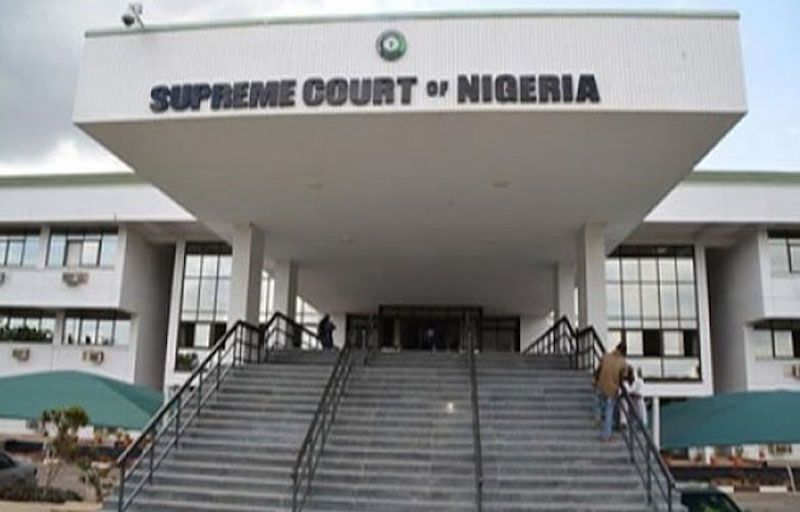The Supreme Court of Nigeria has scheduled a hearing on President Muhammadu Buhari’s lawsuit against the Attorney General of the Federation (AGF) and Minister of Justice, Abubakar Malami, for Thursday, May 19, 2022.
The National Assembly was sued by Buhari and Malami in the Supreme Court for violating Section 84 (12) of the Electoral (Amendment) Act, 2022.
Unless they resign their positions, political appointees like Malami are barred from running for elective office or voting as delegates in a party primary.
The clause in the electoral act was removed by President Buhari and Malami in the lawsuit SC/CV/504/2022, which was filed on April 29, 2022.
Both of them told the Supreme Court that Section 84 (12) of the Electoral (Amendment) Act, 2022, is in conflict with sections 42, 65, 66, 106, 107, 131, 137, 147, 151, 177, 182, 192, and 196 of the Constitution of the Federal Republic of Nigeria, 1999 (as amended), as well as Article 2 of the African Charter on Human and People’s Rights.
As a result, they are asking the court to strike down the section of the Act that they claim is in violation of the country’s constitution.
Buhari urged the parliament to strike down Clause 84(12) of the Act when he signed the amended bill into law on February 25.
“No political appointee at any level shall be a voting delegate or be voted for at any political party’s convention or congress for the purpose of nominating candidates for any election,” according to the clause.
Read Also: NCDMB will host summit on midstream and downstream operations
The President’s request to amend a clause in the electoral act was rejected by both chambers of the National Assembly in March.
Following that, the Attorney-General boasted that the Nigerian government would consider all other options before making a decision.
Buhari and Malami are seeking an order from the court to strike out the section of the Act that they claim is inconsistent with the nation’s constitution, in a suit marked SC/CV/504/2022 and filed on April 29, 2022, with the National Assembly as the sole defendant.
Section 84 (12) of the Electoral (Amendment) Act, 2022, according to the duo, is in conflict with sections 42, 65, 66, 106, 107, 131, 137, 147, 151, 177, 182, 192, and 196 of the Constitution of the Federal Republic of Nigeria, 1999 (as amended), as well as Article 2 of the African Charter on Human and Peoples Rights.
They went on to say that the Nigerian constitution already stipulates qualifications and disqualifications for the President and Vice President, Governor and Deputy Governor, Senate and House of Representatives, House of Assembly, Ministers, Commissioners, and Special Advisers.
According to BarristerNG.com, the court document obtained by SaharaReporters reads: “A DECLARATION that the joint and or combined reading of sections 65, 66, 106, 107, 131, 137, 147, 151, 177, 182, 192, and 196 of the Federal Republic of Nigeria, 1999, (as amended), the provision of Section 84 (12) of the Electoral Act, 2022, which also ignores Section 84(3) of the same
“A DECLARATION that the legislative powers vested in the Defendants do not permit or empower it to make any other law prescribing additional qualifying/disqualifying grounds for election to the National Assembly, House of Assembly, Gubernatorial, and Presidential elections outside the express cl
“A DECLARATION that section 84(12) of the Electoral Act, 2022, prohibiting political appointees from serving as voting delegates or being voted for at a convention or Congress of any political party for the purpose of nominating candidates for any election, is discriminatory, inconsistent, and in violation of Sections 42, 65, 66, 106, 107, 131, 137, 147, 151, 177, 182, 192, and 196 of
“A DECLARATION that the Defendant has acted ultra vires the legislative powers vested in it under the provision of Section 4 of the Federal Republic of Nigeria, 1999 (as amended) and/or in violation or breach of the provisions of Sections 65, 66, 106, 107, 131, 137, 147, 151, 177, 182, 192, and 196, thereby rendering the Electoral Act, 2022, null and void.”
“AN ORDER declaring Section 84 (12) of the Electoral Act, 2022, unconstitutional, illegal, null and void, and made in excess of the 1st Defendant’s legislative powers as enshrined in section 4 of the constitution” (as amended).
“SUCH FURTHER OR OTHER ORDER AS THIS HONORABLE COURT MAY FEEL FIT AND JUST IN THE FACTS OF THIS CASE.”
The National Assembly, on the other hand, has asked the Nigerian Supreme Court to dismiss Buhari and Malami’s lawsuit over Section 84 (12) of the Electoral (Amendment) Act, 2022.
President Buhari signed the electoral bill into law on February 25, 2022, with the caveat that the section be removed in order to strengthen democracy in Nigeria.
Read Also: AfDB’s Adesina not contesting for Presidency
The National Assembly, on the other hand, rejected the President’s request in March, insisting that serving political appointees resign before running for office.
Malami, who disagreed with the lawmakers’ decision, promised that the Nigerian government would look into other options, including going to court, to ensure that the provision in the amended Act was removed because it violated other parts of the constitution.


